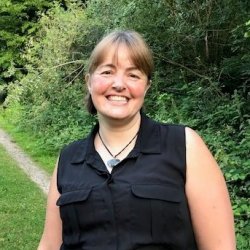
About
Biography
Zoe is a Research Fellow at the Centre of Translation Studies. Her main area of work is on the ESRC-funded SMART project, which is investigating how respeaking technology can shape and provide multilingual access. She is also part of the MATRIC project, investigating Machine Translation and Respeaking in Interlingual Communication. She holds an MA in Audiovisual Translation and a PhD in Translation Studies from the University of Roehampton. Her doctoral research explored how respeaking could be introduced into the live event setting in the UK to broaden the access provided.
Zoe has professional experience of respeaking and subtitling. She is on the editorial board for JoSTrans (Journal of Specialised Translation) and is a member of GALMA (Galician Observatory for Media Accessibility), an international research group, which has led to her involvement in a number of accessibility-related projects.
Areas of specialism
My qualifications
News
In the media
Publications
Live subtitling using speech recognition, known as respeaking, is widely used to make live television programmes accessible. Although a growing area within audiovisual translation internationally, in the UK its industry use has been limited to television, in part due to the many misconceptions surrounding its production. This study explores how respeaking can be introduced to complement current access provision at unscripted or partially scripted events. Through close collaboration with users and providers, respeaking is shown to be a viable way of providing access for deaf, deafened and hard of hearing audience members in this new sector: access that a wider audience is also likely to benefit from. The paper begins with a brief discussion of the audiovisual landscape, focusing on quality in respeaking and current provision in the sector. Next, a bespoke training programme is presented and user and provider expectations for the service are outlined. Finally, the quality of respeaking at a series of research events is discussed. The results indicate that the quality attained for the most part meets, and frequently exceeds, the benchmark of 98% accuracy set for live television subtitling. Latency is similar to that seen on television, yet remains an area for further consideration.
Research and training in respeaking are still lagging behind professional practice. One of the consequences of this lack of training opportunities is the UK government’s refusal, in 2016, to use the Disabled Students’ Allowances (DSA) to provide for respoken subtitles, arguing that respeaking was not a qualified profession. In order to tackle this issue, the Galician Observatory for Media Accessibility set up LiRICS, the Live Respeaking International Certification Standard, which aims to set and maintain high international standards in the respeaking profession. In 2019, after assessing the online certification process proposed by LiRICS, the Department of Education in the UK concluded that it meets their requirements and that LiRICS-certified respeakers are eligible for Disabled Students’ Allowances funding. This article outlines, first, the current provision of respeaking training around the world and the assessments of live subtitling quality carried out to date, both of which inform the LiRICS online certification process presented here. The focus is then placed on the actual certification process, including a description of the tests, the platform used and the quality assurance process. This is followed by an analysis of the respeakers’ performance, which has been shown to be in line with current professional standards.
Zoe Moores met Dan McIntyre at the University of Huddersfield in March 2017. Dan is a Professor of English Language and Linguistics at Huddersfield, with a particular interest in stylistics. Zoe is a PhD research student at the University of Roehampton who is investigating the access that live subtitles provide for the d/Deaf and hard of hearing and other audience groups.
The conversation that follows touches upon the application of stylistics to subtitling, the effect of time and space constraints on characterisation and the impact of creative and accessible approaches within the industry.
In this chapter, Zoe Moores describes her research into how a particular form of live subtitling, called respeaking – where subtitles are created by a person in real-time using speech recognition software – can be used to make live events more accessible and a series of public engagement events that took place in the course of carrying that research out. Public engagement formed an integral part of this project. Not only were the research events Zoe ran public engagement activities, but the entire research design was created in such a way as to embed the practice and values of public engagement into the work from the outset. This chapter summarises how this was done.
Access issues have long been addressed reactively, with subtitling or audio description forming an additional layer to what many consider a final/finished product. As the need for access has become more widely recognised, discussions about access have begun earlier and the very idea that audiovisual products without access might be considered complete is being challenged. Filmmaking and live performance provide examples where access provision is integrated into the production process, yet the question of integrated access at events has not been discussed as fully within media accessibility. In this article, I explore what integrated access at events might look like and consider what a proactive approach involves as we step away from purely media access modalities into the need to embed that access into a more dynamic and participatory setting. After examining what we learn from integrated access in other areas, I focus on peculiarities of the event setting that must be accounted for. I draw on research into respeaking at events which acts as a signpost towards a more integrated approach, and explore guidelines on accessibility and advances in critical event studies to further expand the view. I conclude with a possible framework for supporting proactive access provision.